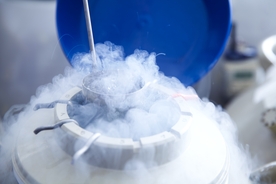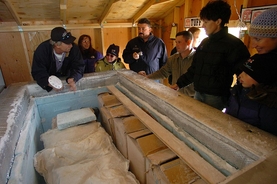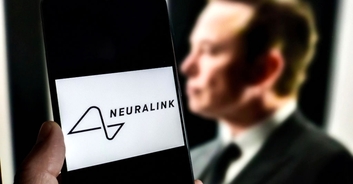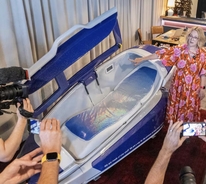Death, the full stop at the end of our appointed sentence, is inevitable. Yet ever since humanity's humble beginnings, our species has been furtively seeking the secret of eternal life. We all want to circumvent our own mortality and avoid the bony embrace of the grim reaper. Whether the answer takes the form of the philosopher's stone or the keys to heaven, history abounds with examples of people trying to find some way to exist after death. But what if the answer to the age-old conundrum didn't come in the form of religion, or mysticism, but via technology?
What if our own science could preserve consciousness, and transfer our active minds into a new vessel, keeping us safe from age, decay and entropy? It sounds like the plot of a Black Mirror episode. But it seems as though this futuristic technology isn't as far-fetched as you might have assumed. Apparently, a new startup is advertising this mad science to the public at large, and has pitched a "100 per cent fatal" offer to any hopeful volunteers; namely, an offer to steal their brains after their death - Frankenstein-style - and then upload the contents of the lump of grey matter to a digital hard drive.
On paper, it sounds like something from a B-movie, but the process isn't all that implausible. Nectome, a Californian company founded by Michael McCanna and Robert McIntyre, has developed a powerful chemical solution which is capable of keeping organic matter fresh and intact as a statue of frozen glass for potentially thousands, so that one day scientists can analyse the individual's brain on a micro-cellular level and map it (or "connectome" it, as it is referred to in neurology), and then recreate the same brain in a still-to-be-written computer program.
That's assuming it works, of course. There are no guarantees that the recreated neural map is actually capable of providing a viable facsimile of a working mind. The issue is that creating a detailed connectome is an unbelievably complicated job. Just consider the fact that one lonely nerve can connect to thousands of others, and that the brain is made up of billions of cells, and you have a task as arduous and painstaking as recreating the entire contents of the British Library one letter at a time.
This February, Nectome was able to test the process on a real-life sample brain. McCanna and McIntyre spent several weeks in Portland, Oregon, waiting with a pathologist to get their mitts on the fresh corpse of an organ donor. They eventually managed to obtain the mortal remains of an old woman who had died of natural causes in the hospital.
Nectome preserved the geriatric brain a mere two and a half hours after the woman drew her last breath, using a process called aldehyde-stabilised cryopreservation to freeze the tissue. The donated brain will be carefully sliced into paper-thin sheets, which will then be scanned and imaged with an electron microscope.
Thus far, Nectome has managed to raise approximately one million dollars in funding for its project; funds which include a $960,000 federal grant from the US National Institute of Mental Health for “whole-brain nanoscale preservation and imaging."
However, there has been some criticism of the initiative from other experts in the field. In an interview with Technology Review neuroscientist Michael Hendricks compared the scheme to a snake-oil con, stating: "Burdening future generations with our brain banks is just comically arrogant. Aren’t we leaving them with enough problems? ... I hope future people are appalled that in the 21st century, the richest and most comfortable people in history spent their money and resources trying to live forever on the backs of their descendants. I mean, it’s a joke, right? They are cartoon bad guys."
However, McIntyre believes that society might not be able to see the benefits of his work for years, perhaps even decades, in the future. In a recent interview, he stated: "Those companies also can’t sell anything now, but there is a lot of interest in technologies that could be revolutionary if they are made to work. I do think that brain preservation has amazing commercial potential ... There is a lot of philosophical debate, but to me, a simulation is close enough that it’s worth something."
He added: "There is a much larger humanitarian aspect to the whole thing. Right now, when a generation of people die, we lose all their collective wisdom. You can transmit knowledge to the next generation, but it’s harder to transmit wisdom, which is learned. Your children have to learn from the same mistakes. That was fine for a while, but we get more powerful every generation. The sheer immense potential of what we can do increases, but the wisdom does not.”
However, his assurances haven't stopped the Massachusetts Institute of Technology from withdrawing funding from the project, citing the fact that they were uncertain if the method of preservation was actually effective enough to retrieve any valuable data. So, unfortunately, it looks like it might be a while yet before San Junipero becomes a reality. But don't feel too disappointed! Check out the five episodes of Black Mirror that have come true.
Featured illustration by Egarcigu





